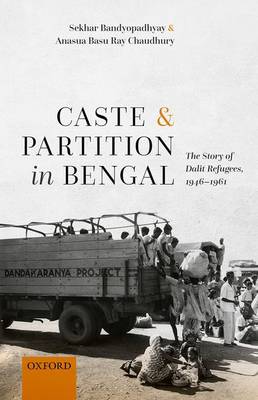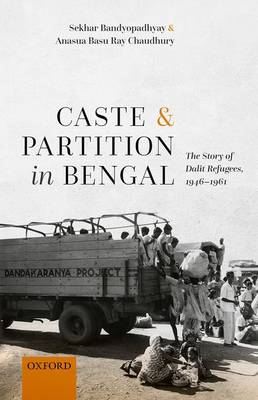
- Afhalen na 1 uur in een winkel met voorraad
- Gratis thuislevering in België vanaf € 30
- Ruim aanbod met 7 miljoen producten
- Afhalen na 1 uur in een winkel met voorraad
- Gratis thuislevering in België vanaf € 30
- Ruim aanbod met 7 miljoen producten
Zoeken
Caste and Partition in Bengal
The Story of Dalit Refugees, 1946-1961
Sekhar Bandyopadhyay, Anasua Basu Ray Chaudhury
Hardcover | Engels
€ 177,45
+ 354 punten
Omschrijving
The book seeks to situate caste as a discursive category in the discussion of Partition in Bengal. In conventional narratives of Partition, the role of the Dalit or the Scheduled Castes is either completely ignored or mentioned in passing. The authors addresse this discursive absence and argues that in Bengal the Dalits were neither passive onlookers nor accidental victims of Partition politics and violence, which ruptured their unity and weakened their political autonomy. They were the worst victims of Partition. When the Dalit peasants of Eastern Bengal began to migrate to India after 1950, they were seen as the 'burden' of a frail economy of West Bengal, and the Indian state did not provide them with a proper rehabilitation package. They were first segregated in fenced refugee camps where life was unbearable, and then dispersed to other parts of India - first to the Andaman Islands and the neighbouring states, and then to the inhospitable terrains of Dandakaranya, where they could be used as cheap labour for various development projects. This book looks critically at their participation in Partition politics, the reasons for their migration three years after Partition, their insufferable life and struggles in the refugee camps, their negotiations with caste and gender identities in these new environments, their organized protests against camp maladministration, and finally their satyagraha campaigns against the Indian state's refugee dispersal policy. This book looks at how refugee politics impacted Dalit identity and protest movements in post-Partition West Bengal.
Specificaties
Betrokkenen
- Auteur(s):
- Uitgeverij:
Inhoud
- Aantal bladzijden:
- 286
- Taal:
- Engels
Eigenschappen
- Productcode (EAN):
- 9780192859723
- Verschijningsdatum:
- 11/08/2022
- Uitvoering:
- Hardcover
- Formaat:
- Genaaid
- Afmetingen:
- 147 mm x 221 mm
- Gewicht:
- 485 g

Alleen bij Standaard Boekhandel
+ 354 punten op je klantenkaart van Standaard Boekhandel
Beoordelingen
We publiceren alleen reviews die voldoen aan de voorwaarden voor reviews. Bekijk onze voorwaarden voor reviews.











